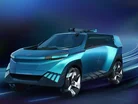Nissan's Autonomous Mobility Services on Public Roads

Nissan has taken a significant step forward in autonomous driving technology by commencing public road demonstrations of a prototype vehicle with its in-house-developed autonomous drive technologies. The initiative is critical to Nissan's strategy to roll out autonomous mobility services by fiscal year 2027.
Prototype features and capabilities
The Nissan LEAF prototype vehicle has 14 cameras, 10 radars and 6 LIDAR sensors.
These components navigate complex urban environments. Compared to earlier prototypes, this latest version has an advanced sensor on the roof, significantly expanding the detection area and improving the accuracy of its surroundings detection.
The sensor suite aims to improve recognition performance, behavioural prediction, judgment functions and control mechanisms for navigate challenging scenarios.
In real-world demonstrations around the busy streets of Yokohama, near Nissan's global headquarters in Japan, the LEAF prototype successfully predicted pedestrian behaviour, conducted lane changes during merging and made safe intersection entries.
Autonomous mobility services timeline
Nissan has been exploring business models for future mobility services since 2017. While the current demonstrations operate at SAE Level 2, which includes a safety driver, Nissan aims to expand these functionalities progressively.
The goal is to offer autonomous-drive mobility services in Japan by fiscal year 2027. It will involve collaboration with local authorities and transport operators to integrate autonomous vehicles seamlessly into existing transport systems.
"Our commitment to advancing autonomous driving technology is exemplified by the LEAF prototype, which represents a significant step towards our goal of offering autonomous mobility services by 2027," states Makoto Uchida, CEO of Nissan.
Nissan plans to begin trials in the Minato Mirai area in the fourth quarter of this fiscal year, with service demonstration tests expected to start by fiscal year 2025. These trials will incrementally increase autonomous driving functionality while evaluating customer acceptance and eventually provide driverless services.
Collaboration with government and industry
This initiative is being conducted in close cooperation with various Japanese governmental bodies, including the Ministry of Economy, Trade and Industry and the Ministry of Land, Infrastructure, Transport and Tourism. These ministries are promoting initiatives to realise new autonomous mobility services through the Level 4 Mobility Acceleration Committee.
Addressing local mobility challenges
Nissan's long-term vision focuses on empowering mobility and addressing transportation service issues faced by local communities. Japan, in particular, is grappling with several mobility challenges, such as driver shortages due to an ageing population.
Nissan aims to resolve these challenges by providing a broad range of new services that enable free and easy movement for all community members.
Prospects
Nissan's commitment to autonomous driving technology aims to transform urban mobility. By addressing both technological and societal challenges, Nissan aims to contribute to the driving experience and create a sustainable and efficient transportation ecosystem.
**************
Make sure you check out the latest edition of EV Magazine and also sign up to our global conference series - Sustainability LIVE 2024
**************
EV Magazine is a BizClik brand


